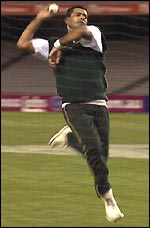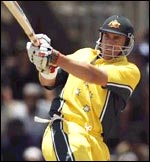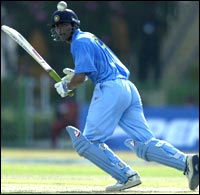Champions Trophy may claim some victims
Daniel Laidlaw
It is dubbed the mini-World Cup and it moves along apace, offering us brief
glimpses of where the world's respective one-day teams stand. England and
India are tired, the latter at least participating. Sri Lanka look a
different side in friendly environs and Australia are playing like
champions. Three of the semi-finalists were effectively decided by Sunday,
with only the brave Zimbabweans capable of upsetting the England and India
applecarts. And the tournament may be about to claim some victims.
Three months ago, Pakistan beat Australia 2-1 and looked potential World Cup
winners. Three months later, they are in 'crisis'. Six months hence, they
could be lifting the Cup in Johannesburg, but that may be several more
crises away. In short, Pakistan are in usual form.
Pakistan finished last behind Sri Lanka and South Africa at the tri-nations
in Morocco last month and were abysmal in sharing the trophy with Australia
in Kenya, the top order batting particularly woeful. After an eight-wicket loss
to the hosts last Thursday, which the ICC's Anti-Corruption Unit is
scrutinising, it could be enough to cost either captain Waqar Younis or
coach Mudassar Nazar their jobs.
 If it does, it would be dreadfully reactionary. Since Waqar succeeded Moin
Khan in April 2001, Pakistan have won 28 ODIs and lost 14. They lost a
one-day final to Sri Lanka in April last year, beat the same opponents in
another Sharjah final in November, and in between lost a Lord's final to
nemesis Australia. There was a 3-0 sweep of Bangladesh in January, followed
by another Sharjah tournament win over Sri Lanka in April. New Zealand were
then swept 3-0, Australia were beaten 2-1, before the recent Morocco and
Kenya debacles.
If it does, it would be dreadfully reactionary. Since Waqar succeeded Moin
Khan in April 2001, Pakistan have won 28 ODIs and lost 14. They lost a
one-day final to Sri Lanka in April last year, beat the same opponents in
another Sharjah final in November, and in between lost a Lord's final to
nemesis Australia. There was a 3-0 sweep of Bangladesh in January, followed
by another Sharjah tournament win over Sri Lanka in April. New Zealand were
then swept 3-0, Australia were beaten 2-1, before the recent Morocco and
Kenya debacles.
The last pair of failures has apparently been seen as a trend rather than an
aberration, despite the fact Saqlain Mushtaq did not play in either, Yousuf
Youhana missed Kenya after being bizarrely disciplined and Inzamam-ul-Haq
only played in the Nairobi final. They're not excuses for the manner of the
defeats, which must be most disturbing, but they're not irrelevant factors,
either.
Pakistan appear to be in no more than one of their periodic troughs. Test
results don't even enter the equation; Pakistan have hardly played in the
last 12 months and Waqar's record in charge is excellent. A win over Sri
Lanka, and it may have been different. Instead, the PCB held "a meeting of
cricketing affairs," on Saturday, otherwise known as a scapegoating session.
Coach Mudassar Nazar has been called to account.
"The meeting was required to look at things in the proper perspective and
take stock of the situation," PCB director Chishty Mujahid was quoted as saying by Reuters. "We don't want to take any hasty decisions and regret it
later. After all, this team has been doing well since last year." Uh-oh.
 Australia's struggles in January, when they failed to make the finals of
their home tri-series, now seem a long time ago. So too, in the fast-moving
one-day world, do the limited-overs careers of the Waugh brothers.
Australia's struggles in January, when they failed to make the finals of
their home tri-series, now seem a long time ago. So too, in the fast-moving
one-day world, do the limited-overs careers of the Waugh brothers.
Matthew Hayden is averaging 154 in ODIs this season. McGrath and Gillespie
have been overwhelming. Australia, who failed at home by losing three of
four games against New Zealand, extracted a measure of revenge against the
Kiwis in what was effectively the quarter-final stage, winning a match at the
transmogrified Champions Trophy for the first time after being eliminated by
India in the two previous editions. It was decided in the first 15 overs of
each innings: Australia 109/1 after 15 batting first; New Zealand 73/7.
The three areas in which Australia needed to make progress have all seen
improvement. Hayden has emphatically established himself as a one-day
opener. Rookie Shane Watson, who helped win a difficult match with the bat
against Kenya and has bowled economically, is improving steadily as an
all-rounder. And the third area, Brett Lee's re-establishment as a reliable
one-day bowler, has also been highly encouraging with the speedster
returning to concentrating on a line and length again, the loss of focus
with tail-ender Shane Bond in his sights notwithstanding. Ponting went so
far as to label Lee the shining light of the Kenya trip, telling CricInfo
"he remained genuinely quick but was more accurate."
Meanwhile, Sri Lanka. The Champions Trophy hosts have not lost a one-day
tournament or series at home since July 1998, when they were beaten by
Azharuddin's India. They are now into a semi-final against Australia, whom
they last played in August 1999 when Sri Lanka won a tri-series final by 8
wickets, also at Premadasa. The composition of the Australian team is not
that different to the one that played then, which after dominating the
preliminaries was strangled by the spin of Murali, Chandana and Jayasuriya.
Its weakness has not changed: Vettori took 1/25 off 10 overs amid otherwise
ugly NZ bowling figures.
 Then there is India, whose strength of batting depth is unparalleled in ODIs
at present. Mohammad Kaif has played consecutive match-winning innings for
his team. An innings of substance batting at No. 7 is a difficult feat, but
Kaif has shown he is a rare talent. Without his knock, the under-rated Andy
Flower's heroics would have had Zimbabwe well-positioned for the semi-finals.
Then there is India, whose strength of batting depth is unparalleled in ODIs
at present. Mohammad Kaif has played consecutive match-winning innings for
his team. An innings of substance batting at No. 7 is a difficult feat, but
Kaif has shown he is a rare talent. Without his knock, the under-rated Andy
Flower's heroics would have had Zimbabwe well-positioned for the semi-finals.
As Kaif demonstrated, India, along with Pakistan, is the most explosive team
in the late stages of an innings, with an unrivalled ability to suddenly
unleash its firepower. India require that depth and explosiveness, though,
for the bowling attack is a containing rather than penetrative one.
More than the teams involved, the most intriguing facet of the tournament to
date has probably been the use of technology. Wasim Akram is right in that
the aesthetics of the appeal have been somewhat reduced, replaced by the
uncertainty of whether the umpire will confer with the TV official. Even
when an umpire does immediately raise his finger, uncertainty still lingers,
as Holland discovered on Monday when Dave Orchard gave Mahela Jayawardene
out before consulting the third umpire, and annulling his original lbw
decision.
Unsatisfactory as this may be, it is surely the correct approach if
technology is going to be used: if wrong decisions can't be over-ruled, what's the point? This will undoubtedly become more of an issue when an umpire
clearly errs without referring to his colleague, and the third umpire is
powerless to intervene.
As other critics have previously observed, the Champions Trophy won't
present controversial bat-pad test cases and thus can't be seen as an
entirely effective template for Test cricket. The system needs to be
trialled for longer than just this tournament before it is introduced for
the World Cup, too. It is quite possible that unforeseen scenarios may take
more than the Champions Trophy's 15 games to occur and it would be a concern
if the World Cup were only the second tournament in which the system is
used. A further trial period, at least between now and Cup, would be a
sensible option before its permanent implementation is considered.
ICC Champions Trophy - The Complete Coverage
More Columns
Mail Daniel Laidlaw